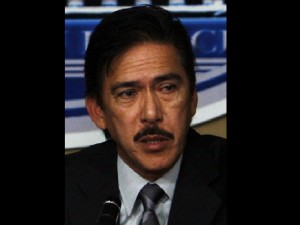Senate Majority Leader Vicente Sotto III on Monday denied allegations he surreptitiously slipped in higher penalties for online libel in the controversial Cybercrime Prevention Act.
Calling himself “the cyberbullies’ whipping boy,” Sotto said he was not even among the original authors of previous drafts of the law when these were filed mostly in 2011.
Those who filed separate bills on the subject included Senate President Juan Ponce Enrile and Senators Antonio Trillanes IV, Edgardo Angara, Manuel “Lito” Lapid, Manuel Villar, Ferdinand Marcos Jr., Ramon Revilla Jr., Miriam Defensor-Santiago and Jose “Jinggoy” Estrada, according to Sotto.
The consolidated report of all the drafts was presented by Angara on May 11, 2011. Individual amendments were introduced mostly in January 2012.
Sotto said he received brickbats from critics for supposedly delivering plagiarized speeches on the reproductive health (RH) bill only in August and September this year.
By that time, both the Senate and the House of Representatives had reconciled the disagreeing provisions of their versions of the Cybercrime Prevention Act.
This means, according to Sotto, he could not have been inspired to introduce amendments that would in effect raise the penalties for online libel since Congress had already finished its business on the matter.
“Cyberbullies should not be too presumptuous. They have a feeling that the Senate would enact a law for them? Excuse me,” Sotto said in a privilege speech.
The senator stressed he gave the speech “to set the record straight, stop the blame-tossing and address the paranoia” of his critics.
Angara earlier announced his plan to file amendments to the cyberlaw after netizens raised a howl over the higher penalties for online libel and a provision giving the justice department “takedown” powers to discipline offensive websites.
Santiago said the Supreme Court could declare the existing law unconstitutional for its “over-broad and too vague” provisions.
Repeal of penalties
Also on Monday, Sen. Loren Legarda filed a bill seeking to repeal the law’s libel penalties. “I hope to eliminate the chilling effect that may impose undue boundaries on our people’s exercise of freedom of expression,” she explained.
Bayan Muna Rep. Teodoro Casiño, in a statement e-mailed to the Philippine Daily Inquirer, warned the new law even penalized not only users of the Internet but also of cell phones.
He said the law covers any medium of ICT (information and communication technology) media, including voice and video, and defines computers and computer system as “any type of computer device, including devices with data processing capabilities like mobile phones, smartphones, computer networks and other devices connected to the Internet.”
“This practically means that communications and data on any type of phone or ICT device are covered by this very repressive law,” he said.
He said candidates—who might try to put down an opponent via text messages—could find themselves in trouble.
“This means if I text my friends that a certain candidate is a ‘cheap, second-rate, trying hard copycat,’ that person can haul me to court for violating the cybercrime law and have me locked up for 10 years,” Casiño said.
“The mere possibility that one can be charged for online libel is enough to silence ordinary people and stop them from expressing critical ideas,” he added.
Samuel Matunog, vice president of Davao ICT Inc., said the law could also kill the bullish ICT sector.
He said the law allowed the Department of Justice to shut down or block access to a computer data, if found to be violating the act. This could potentially bring millions of damage to the industry, he said.
“What if malicious pranksters will just lodge unfounded complaints? Before we know it, our computers are already blocked,” Matunog said. With reports from Allan Nawal and Germelina Lacorte, Inquirer Mindanao
